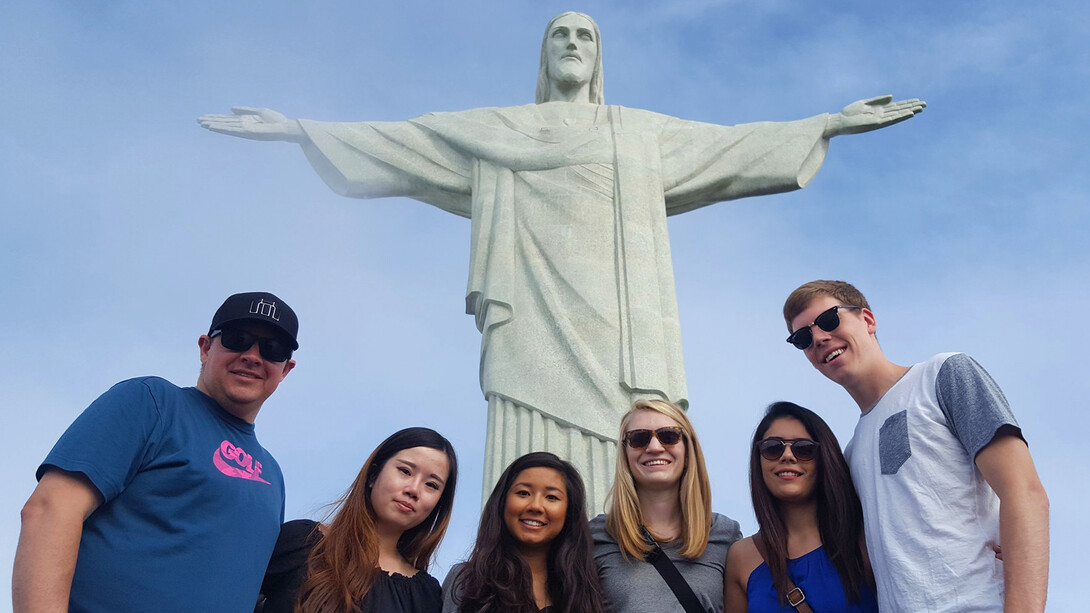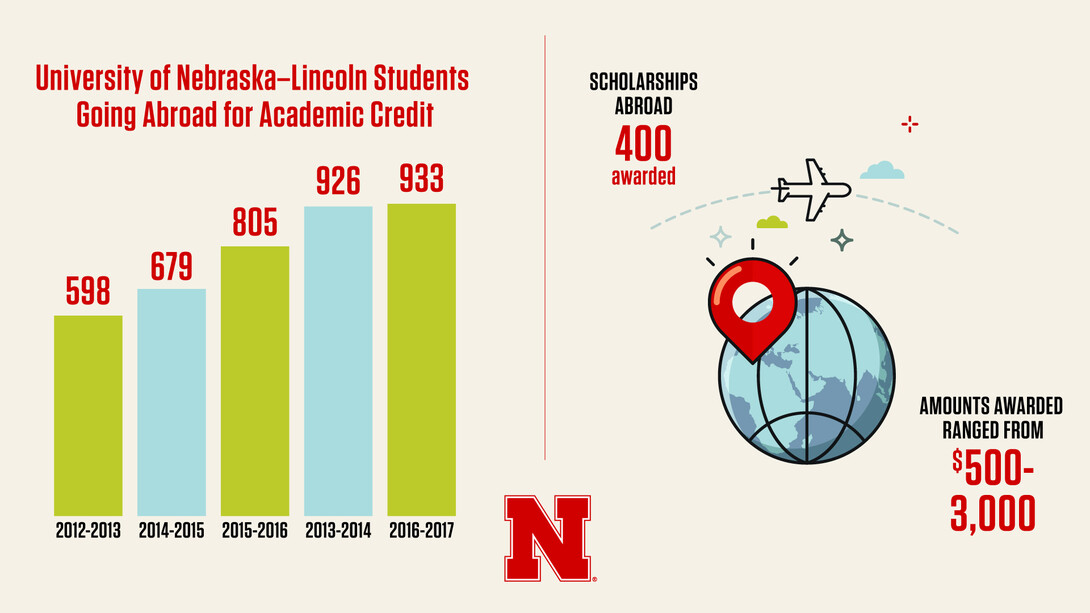
It has been another successful year for the University of Nebraska-Lincoln. In the spirit of the holiday season, we’re unwrapping the impact of the state’s flagship institution and taking a closer look at some highlights. Today, “Nebraska Unwrapped” is focusing on student experience. Other topics in the series include innovation, outreach and research.
More than ever, University of Nebraska–Lincoln students are hopping the globe.
In fact, over 1,000 Nebraska students are pursuing international experiences each year, building skills, experiencing new cultures, expanding their networks, gaining confidence and perspective, and maybe even solidifying their career path.
That’s what happened for senior Danielle Trejo of Johnsonville, Florida, when she spent a semester in Chile in 2016, taking Spanish classes and completing an internship for an after-school program in a low-income community. Trejo, a global studies major, plans to go to law school after graduating in May 2018 to pursue a career helping immigrants and refugees come to the United States.
“It broadened my understanding of human rights,” Trejo said of her semester abroad. “I developed a much stronger appreciation for things that are happening globally but impact us directly. I know the importance of immigration and refugee resettlement, for those individuals impacted by violence, and to strengthen our economy and population.”
The Spanish language skills she honed while in Chile will pay dividends in her future, as will the experience of a culture very different from her own.
“Seeing different levels of poverty and how that community was helping those kids gave me a different perspective for solving similar problems in the United States,” she said.
Trejo said she could not have afforded the semester in South America without the “great resources” in the Education Abroad Office and the Department of Global Studies. In the last five years, sending more students abroad has been a university-wide goal. After restructuring in 2011, the Education Abroad Office, directed by Rebecca Baskerville, has seen large upticks each year in students studying overseas. For example, during the 2012-2013 academic year, 598 students studied abroad for academic credit. That number ballooned to 933 by the 2016-2017 academic year. Each year, an additional 200-plus students pursue non-credit experiences, Baskerville said.
Faculty-led programs, which continue to be the most popular format at Nebraska, increased from 27 programs in 2012-2013 to 47 programs in 2016-2017. Most programs are delivered in English with themes as diverse as comparative law in China, healthcare in Costa Rica, wildlife conservation in Botswana, and tourism in Oman and the United Arab Emirates.
Among the changes that made education abroad more attractive and feasible for students was a university-wide effort to offer more experiential learning through internships, research, and service learning, build out relationships in the colleges, departments and units, and establish new scholarships. Beyond supporting students financially, the Early Abroad Scholarship has prompted students to study abroad in the first half of their undergraduate careers, leaving time to go abroad again before graduation.
Scholarships and the people in place to help students identify their own personal, academic and professional motivations make all the difference for students like Trejo and Nicole Timm, a junior from Lincoln. She spent the spring 2017 semester in Peru, studying Spanish and volunteering in an orphanage, tutoring children.
“Emira (Ibrahimpasic) helped me find available scholarships and I worked with Education Abroad to find a great program and apply,” Timm said. “I was able to make the semester abroad cost about the same as completing a semester here, but I gained so much by studying in Peru, especially in understanding and speaking conversationally in Spanish.”

Here are more highlights of the student experience at the university:
More than 5,200 degrees were conferred at commencement ceremonies held in May, August and December.
Art at Cedar Point brings undergraduates to western Nebraska take studio art courses and lead a summer art camp for area children at the Cedar Point Biological Station near Ogallala.
The university is among the best in the nation for military and veteran support. Its Military and Veterans Success Center is integral in helping active military continue their education while serving their country, and this year was especially important as many National Guard soldiers were called up for disaster relief when hurricanes decimated parts of the United States.
Journalism students’ in-depth reporting project, “The Wounds of Whiteclay,” earned the Robert F. Kennedy Journalism Award grand prize, beating out National Geographic, The New Yorker, HBO and Univision. This was the first time a college entry won the honor in the award’s 49-year history. The project also earned the Kennedy Prize for a depth report, a national collegiate journalism award given to one school per year.
Husker Dialogues continued to help students have important discussions about diversity and inclusion.
Staff and faculty united to support first-generation students across campus.







